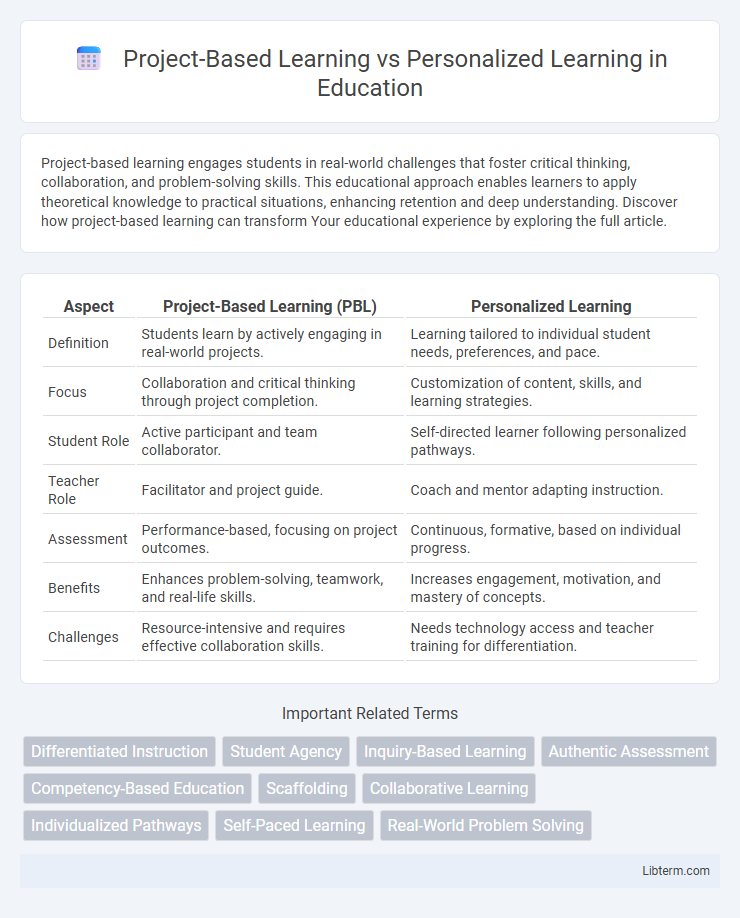Project-based learning engages students in real-world challenges that foster critical thinking, collaboration, and problem-solving skills. This educational approach enables learners to apply theoretical knowledge to practical situations, enhancing retention and deep understanding. Discover how project-based learning can transform Your educational experience by exploring the full article.
Table of Comparison
| Aspect | Project-Based Learning (PBL) | Personalized Learning |
|---|---|---|
| Definition | Students learn by actively engaging in real-world projects. | Learning tailored to individual student needs, preferences, and pace. |
| Focus | Collaboration and critical thinking through project completion. | Customization of content, skills, and learning strategies. |
| Student Role | Active participant and team collaborator. | Self-directed learner following personalized pathways. |
| Teacher Role | Facilitator and project guide. | Coach and mentor adapting instruction. |
| Assessment | Performance-based, focusing on project outcomes. | Continuous, formative, based on individual progress. |
| Benefits | Enhances problem-solving, teamwork, and real-life skills. | Increases engagement, motivation, and mastery of concepts. |
| Challenges | Resource-intensive and requires effective collaboration skills. | Needs technology access and teacher training for differentiation. |
Introduction to Project-Based Learning and Personalized Learning
Project-Based Learning (PBL) centers on students engaging in real-world projects to develop critical thinking, collaboration, and problem-solving skills through hands-on experiences. Personalized Learning tailors educational content, pace, and approach to individual student needs, strengths, and interests, enhancing learner autonomy and motivation. Both methodologies aim to improve student engagement and learning outcomes by addressing diverse learning preferences and fostering deeper understanding.
Core Principles of Project-Based Learning
Project-Based Learning (PBL) centers on student-driven inquiry through real-world projects, emphasizing collaboration, critical thinking, and problem-solving within authentic contexts. Core principles include sustained inquiry, student voice and choice, reflection, and public product creation, fostering deeper understanding and engagement. In contrast to Personalized Learning, which tailors instruction to individual needs and pace, PBL integrates learning objectives through collective, hands-on experiences.
Foundational Elements of Personalized Learning
Personalized learning centers on tailoring educational experiences to individual students' strengths, needs, and interests through dynamic assessments and adaptive instruction. Key foundational elements include learner profiles, customized learning pathways, and competency-based progression, enabling mastery at a personalized pace. This approach contrasts with project-based learning, which emphasizes collaborative, interdisciplinary projects but may not inherently adapt to individual learner variability.
Key Differences Between Project-Based and Personalized Learning
Project-Based Learning (PBL) centers on students acquiring knowledge and skills through active exploration of real-world challenges, emphasizing collaboration and hands-on projects. Personalized Learning tailors educational experiences to individual student preferences, pace, and learning styles using adaptive technologies and customized content. Key differences include PBL's focus on group problem-solving and product creation versus Personalized Learning's emphasis on individual learning pathways and self-paced progression.
Benefits of Project-Based Learning
Project-Based Learning (PBL) enhances critical thinking and problem-solving skills by engaging students in real-world challenges that require collaboration and creativity. It promotes deeper understanding of subject matter through active exploration and practical application, resulting in higher retention and student motivation. PBL also fosters communication skills and adaptability, preparing learners for complex workplace environments and lifelong learning.
Advantages of Personalized Learning
Personalized learning offers tailored educational experiences that adapt to each student's unique strengths, weaknesses, and interests, promoting higher engagement and motivation. This approach leverages data-driven insights and adaptive technologies to provide real-time feedback and targeted support, resulting in improved academic outcomes and deeper understanding. By catering to individual learning paces and styles, personalized learning fosters greater autonomy and lifelong learning skills, making it a highly effective method compared to one-size-fits-all strategies.
Challenges in Implementing Both Approaches
Project-Based Learning faces challenges such as the need for extensive teacher training, time-intensive planning, and difficulties in assessing diverse project outcomes. Personalized Learning encounters obstacles including the requirement for advanced adaptive technologies, varied student readiness levels, and increased demand for individualized teacher support. Both approaches must overcome resource limitations and scalability issues to effectively integrate into traditional education systems.
Impact on Student Engagement and Outcomes
Project-Based Learning fosters higher student engagement by promoting real-world problem-solving and collaboration, which enhances critical thinking and knowledge retention. Personalized Learning tailors educational experiences to individual student needs, boosting motivation and improving academic outcomes through adaptive pacing and targeted support. Both approaches significantly impact student success, with Project-Based Learning emphasizing experiential depth and Personalized Learning maximizing individualized growth.
Integrating Project-Based and Personalized Learning Models
Integrating project-based and personalized learning models enhances student engagement by tailoring projects to individual interests and learning styles, fostering deeper understanding and skill mastery. This hybrid approach leverages real-world problem-solving through projects while adapting content, pacing, and assessment to meet diverse learner needs. Combining these models creates a dynamic, student-centered environment that improves motivation, critical thinking, and academic outcomes.
Choosing the Right Approach for Your Educational Goals
Selecting the right educational approach depends on your specific goals, with project-based learning emphasizing real-world problem-solving and collaboration, ideal for developing critical thinking and teamwork skills. Personalized learning tailors instruction to individual student needs, promoting self-paced progress and mastery of subjects through adaptive technologies and customized content. Evaluating factors such as student engagement, curriculum flexibility, and desired learning outcomes will guide educators in implementing the most effective strategy for their classroom.
Project-Based Learning Infographic

 libterm.com
libterm.com